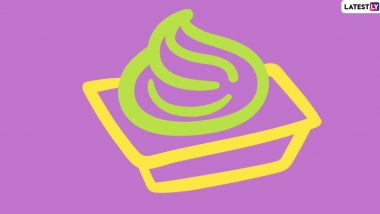An Israeli woman found out in the worst way possible that the pale green condiment on her plate was not guacamole but wasabi instead. The woman in her 60s who was attending a wedding piled on a large amount of wasabi on her plate thinking it’s an avocado dip. She only found out that it was the spicy Japanese condiment after she had a spoonful of it. She started suffering from chest pain immediately, which subsided eventually. But on the following day, the woman experienced fatigue and general discomfort, and decided to go to the hospital. Doctors found out that a large amount of wasabi she ate triggered Takotsubo cardiomyopathy, known colloquially as the “Broken Heart Syndrome.” Her case is documented in BMJ Case Reports.
Wasabi is an extremely sharp-tasting paste used extensively in Japanese cuisine, and it’s made of horseradish. Often, a tiny amount is enough to make the eyes and nose water. Its pungency can be attributed to the volatile compound allyl isothiocyanate, which produces stinging vapours in the nasal passage.
What Is Broken Heart Syndrome?
The doctors claim that eating a large amount of wasabi caused chest pain and subsequent takotsubo cardiomyopathy or stress-induced cardiomyopathy in the woman. It’s called broken heart syndrome because it causes heart muscle failure, triggered by any kind of stressful episode. 8 Factors from Loneliness to Child Abuse that Impair Your Cardiac Health.
Emotionally distressing incidents like heartbreak, the demise of a loved one or financial troubles are not the only factors that trigger an excess of stress hormones. But often positive factors such as receiving extremely good news can lead to broken heart syndrome.
The woman most likely suffered from physical stress after she ate a large amount of wasabi. This, combined with the shock, could have caused the heart condition.
The Side Effects of Wasabi
Wasabi has a lot of health benefits and is consumed primarily with sushi and sashimi (which often contains uncooked fish) for its antimicrobial effects. Japanese horseradish is said to prevent heart diseases, cancer, osteoporosis and other inflammatory conditions. The Penis and Heart Connection: What Your Sex Life Says About Your Cardiovascular Health.
Its pungent taste prevents anyone from eating more than a few grams of the wasabi paste. But ingesting a large amount accidentally can have devastating consequences. Its pungent compounds can irritate not only the nasal passage but also the stomach. People who are vulnerable to gastritis, indigestion, heartburn, acid reflux, haemorrhoids, asthma and clotting disorders should steer clear of consuming too much wasabi.
(The above story first appeared on LatestLY on Sep 25, 2019 12:19 PM IST. For more news and updates on politics, world, sports, entertainment and lifestyle, log on to our website latestly.com).













 Quickly
Quickly


